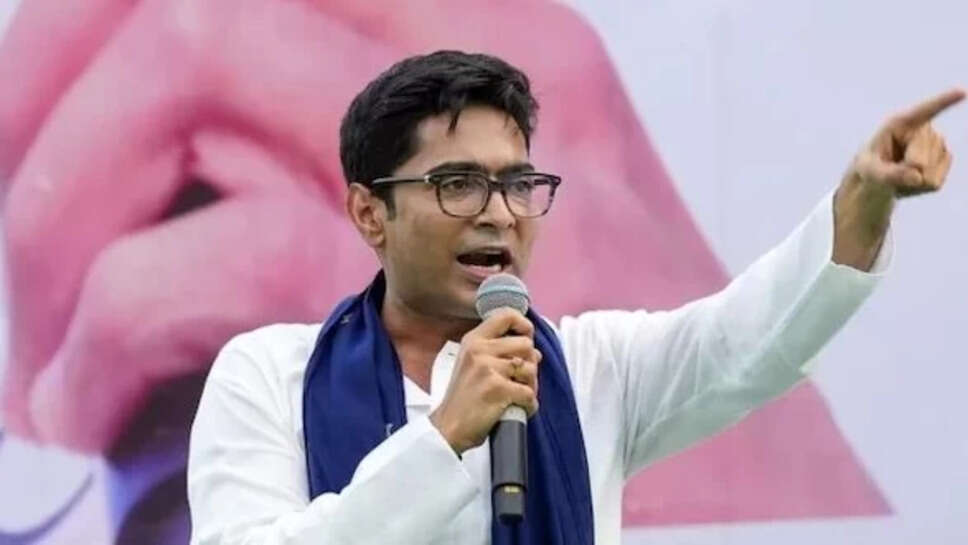Abhishek Banerjee Slams Govt’s Foreign Tours, Demands Answers on Real Support for India

Abhishek Banerjee, senior leader of the Trinamool Congress and a prominent member of India’s political landscape, has stirred the national discourse with a pointed question aimed at the government’s foreign policy efforts. Speaking at a public event recently, Banerjee questioned the effectiveness of India’s all-party global outreach initiatives, particularly the extensive foreign tours conducted over the last few years. His statement—“33 countries toured, how many backed India?”—was a critique not only of the government’s diplomatic strategies but also of its narrative of international support and growing global stature.
Context of the Comment
Banerjee’s remarks come at a time when India is deeply engaged on the international stage—both diplomatically and strategically. From high-level summits to defense alliances, trade pacts to climate commitments, India has been investing significantly in foreign policy. The government’s all-party outreach effort was introduced as a way to involve opposition leaders in diplomatic engagements and to present a united political front abroad.
As part of these delegations, representatives from multiple parties, including the Trinamool Congress, were invited to accompany officials to various international forums. These tours have taken place across continents—from the United States and Europe to Africa, the Middle East, and Southeast Asia—covering a broad spectrum of issues ranging from trade and defense to diaspora engagement and global governance.
The Core of the Criticism
Abhishek Banerjee’s central concern appears to be the lack of tangible outcomes from these engagements. He challenged the government to account for the actual diplomatic gains from these visits. “It’s not about how many countries we visited. It’s about how many of them are willing to stand with us when it matters most,” he said.
This comment is widely seen as a subtle jab at the government’s claims of growing global support, particularly in light of recent international developments where India’s positions have faced lukewarm backing. These include global votes on climate, human rights, and regional security issues, where India has either abstained or struggled to gain wide consensus for its stance.
A Larger Political Strategy?
Political observers believe that Banerjee’s critique is part of a broader attempt by the opposition to reclaim the foreign policy narrative from the ruling party, which has often showcased Prime Minister Narendra Modi’s international diplomacy as a key achievement. The repeated highlighting of the number of foreign visits, high-profile summits, and meetings with global leaders has been a staple in government communications.
By questioning the effectiveness of these visits, Banerjee and other opposition leaders may be attempting to shift the public discourse from optics to outcomes—demanding a metric of success based not on travel but on strategic support and alignment from foreign governments.
Metrics of Success: Quantity vs. Quality
The all-party outreach, which was initially praised for being inclusive, is now facing questions about its transparency and impact. According to sources close to opposition parties, some leaders feel they were invited merely as tokens, with little role in actual diplomacy. Banerjee echoed this sentiment in his speech, stating, “We are being sent to smile for cameras, but the decisions are made elsewhere.”
The government, on its part, continues to assert that these outreach efforts help present a more cohesive and bipartisan image of India abroad. Officials argue that foreign governments appreciate the non-partisan nature of such delegations, which suggests a stable and mature democracy.
Yet, critics like Banerjee counter this by arguing that such symbolic representation must be followed by tangible outcomes, such as trade agreements, strategic alignments, or global endorsements of India’s key policies—on issues like terrorism, border security, climate finance, or technology transfer.
Rising Diplomatic Challenges
India’s position on global issues has become increasingly complex in recent years. On one hand, it has forged stronger ties with Western powers like the United States, France, and Australia through platforms such as the Quad. On the other hand, it continues to maintain strategic autonomy, engaging with Russia, Iran, and China in multilateral platforms like BRICS and the Shanghai Cooperation Organisation (SCO).
Navigating these relationships requires more than just diplomatic presence; it demands consistent policy articulation, mutual benefits, and a shared vision. Critics argue that despite extensive travels, India has occasionally found itself isolated on the global stage, especially on issues like the Ukraine war, trade barriers, and digital regulation.
Banerjee’s question—how many of these 33 countries have truly backed India when needed—reflects this concern. It points to a deeper anxiety that global diplomacy might be veering toward performative alliances rather than substantive partnerships.
Domestic Implications of Foreign Policy
Foreign policy has always had a significant domestic dimension, and Banerjee’s intervention is an example of how international affairs are becoming a part of everyday political debates in India. In an election year or during major state polls, leaders often cite foreign policy achievements or failures to build narratives around national pride, security, and development.
Banerjee’s statement could resonate with voters who feel that foreign visits and handshakes abroad have little bearing on their immediate concerns—like jobs, inflation, education, and health. It also reflects a broader demand for accountability and transparency in policy outcomes, even in areas traditionally considered the domain of the executive.
Government’s Likely Response
So far, the central government has not officially responded to Banerjee’s remark. However, BJP leaders have often countered such critiques by showcasing India’s increased visibility in global forums, expanding trade figures, and the rise in foreign direct investment. They are also likely to highlight support received during international crises—such as the COVID-19 vaccine cooperation, defense procurements, and diplomatic stances against terrorism.
Nonetheless, Banerjee’s challenge may force the government to release more detailed white papers or progress reports on the outcomes of these foreign visits—something that could become a recurring demand from the opposition.
Abhishek Banerjee’s sharp question—“33 countries toured, how many backed India?”—is more than just a political jibe. It is a reminder that diplomacy must deliver. While foreign engagements and all-party outreach initiatives are essential in a globalized world, they must translate into support where it counts—be it on policy, defense, trade, or moral positioning.
His statement may well rekindle public interest in the accountability of foreign policy. It challenges the government not just to travel and talk, but to secure partnerships that reflect shared values and strategic interests. As India seeks to position itself as a global leader, voices like Banerjee’s will ensure that the road to international recognition remains grounded in results, not just rhetoric.
